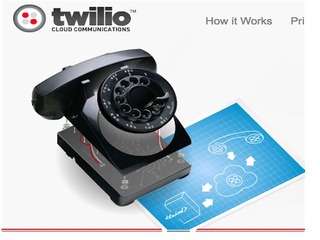
Twilio clients pre-pay for services like SMS messaging, phone numbers and minutes, then draw it down

Despite advances in technology, communication between businesses and consumers is still pretty unevolved. Either it's interacting through social media, or making a phone call.
Twilio is the company that's changing that. It gives its clients the ability to integrate voice, messaging and/or VoIP capabilities into a Web or mobile app.
The prospect of better communication tools has led the company to some very high profile clients, include Salesforce, Coca Cola, Box, Hulu, Uber, The Home Depot, eBay, Intuit, TaskRabbit, Sprint, Trulia, Zendesk, Sony, Shopify and AirBnb, all of whom integrate Twilio features into their apps.
The company makes its money by charging its clients a per-minute rate for calls, a per-message rate for text message, and a monthly rate for Twilio phone numbers.
Twilio clients pre-pay for services, such as minutes, SMS messages, phone numbers, transcriptions, etc., and the company will draw down their account balance as they are used. Customers get notified by email when their balance hits $5.00 and again when their balance reaches $0. When the account reaches $0, it will be suspended.
Voice rates
Rates change based on which country calls and texts are sent and received. Let's look at the prices inside the United States, for example.
For local connectivity, clients are charged $1.00 per month, and then $0.0075 per minute to receive calls, and $0.015 per minute to make calls. If they set up a toll-free number, which are phone numbers that are free for callers, clients are charged $2 a month and then $0.0275 per minute to receive calls, and $0.015 per minute to make calls.
For programmable call recording, which allows clients to securely record, store, transcribe, and retrieve voice calls in the cloud, they pay $0.0025 per min for a recording and $0.05 per min for transcription. For recording storage, the first 10,000 minutes are stored for free and storage of additional minutes cost $0.0005 per min per month.
While basic conference calling is free, global conferencing costs $0.0020 per participant per minute.
SMS rates
Local numbers are $1 a month, along with paying $0.0075 to receive or send a message. That price goes up to $0.01 to receive, and $0.02 to send, a picture message.
Clients that sign up for short code phone numbers, which are 5-6 digit phone numbers that can send and receive messages with mobile phones, they pay $3,000 over three months, and pay an additional $0.005 to receive a message and $0.01 to send one. That price goes up to $0.01 to receive, and $0.02 to send, a picture message.
Toll free numbers cost $2 a month, plus $0.0075 to receive or send a message.
Media storage is free for the first 5 GB, then 0.20 per GB after that.
Revenue
These are almost all very small rates, but they add up quickly. Twilio reached an annual run rate of $100 million in 2014. it is now adding $1 million in recurring revenue every week.
In the first half of 2015, the company booked $71.74 million in sales, with cost of revenue of $32.32 million. Those figures leave a gross profit of $39.42 million for the period. Deducting operating expenses and other costs, Twilio had a net loss of $16.370 million in the first six months of 2015.
More than 560,000 developers currently use the service.
Founded in 2007, Twilio has raised over $240 million from investors such as Fidelity, T. Rowe Price, Bessemer, DFJ, Redpoint and Union Square Ventures as well as strategic investors Amazon.com and Salesforce Ventures.
Related Companies, Investors, and Entrepreneurs
Related News


Twilio raises $3.7 million for cloud comm

Twilio buys two factor authentication company Authy

Twilio nabs $17M for cloud computing, mobile services

